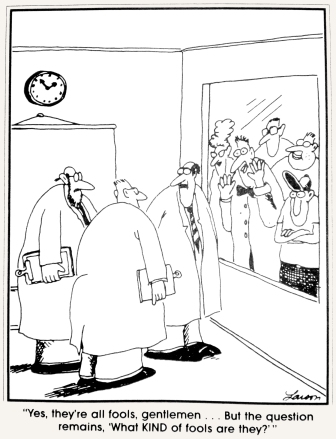William Faulkner: not a big proponent, it would seem, of the famous Fiction 101 directive “show, don’t tell.” What’s wrong with telling, after all? If you’ve to something to say, don’t go dropping a bunch of hints about it—say it. If, for instance, you want to get across that one of your characters is a puritan, there’s no reason to piddle around with assorted vignettes of him acting all “puritan-y”—just call him a puritan, for Heaven’s sake. Time is money.
And let’s say you want to convey that the players in your novel Absalom, Absalom! are doomed. Why bother with ominous mood-setting or grave harbingers or any such circumlocution when there’s already a perfectly good word to accomplish your goal? It’s quite versatile, too: “the very situation to which and by which he was doomed,” “children which she had doomed by conceiving them,” “the current of retribution and fatality which…doomed all his blood,” “caught and sunk and doomed too,” or—this last one also quite comprehensive—“the oblivion to which we are all doomed.”
Doomed pitches a pretty big tent: it encompasses “doomed children,” “doomed ships,” a “doomed house,” “doomed and frustrated youth,” “doomed and tragic flower faces,” a “doomed and fatal war,” and two—count ’em—“two doomed races.” Also “the lonely and foredoomed and indomitable iron spirit” (which is distinguished, presumably, from a post-doomed spirit, whatever exactly that would be.)
And if your characters’ doom is dooming them to some doom in particular, it works for that, as well: “doomed to marry,” “doomed to be a widow,” “doomed to be a murderer,” “doomed and destined to kill,” “doomed to contemplate all human behavior” (said human behavior involving a lot of marital and homicidal impulses, apparently). It can be used for dramatic counterintuitive effect, like “doomed to live”—and then this permutation can be paired with various different subjects, as in “those who are doomed to live,” “I am doomed to live,” and “she and I both are doomed to live.” It is also resilient, standing up to repeated, concentrated use in such iterations as “doomed to spinsterhood” (p. 146), “doomed to spinsterhood” (p. 147), and “doomed to spinsterhood” (p. 148).
Nor need there be any namby-pambying about the ultimate orchestrator of all these characters’ sorry fates: doom! (Crash of thunder.) “[T]he mistake…which, since he refused to accept it or be stopped by it, became his doom”; “that doom which we call female victory which is: endure and then endure”; “the knell and doom of her native land”; “the family’s doom which Sutpen seemed bent on accomplishing” (this last one proving to be a family affair indeed as we are told that Thomas Sutpen’s son, Henry, also “play[ed] his final part in his family’s doom”).
At one point, two characters are discussing a third (doomed) character, in the light of some inherited insight: “‘Maybe he knew there was a fate, a doom on him, like what the old Aunt Rosa told you about some things that just have to be.’” Not like what old Aunt Rosa showed you—what she told you. QED.



